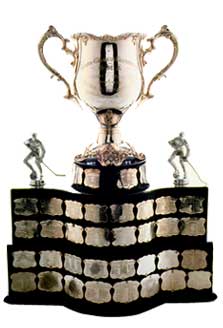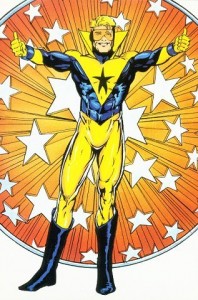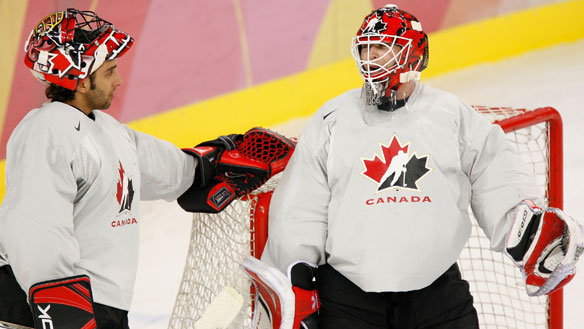My weekend in junior hockey, Mar. 5 – 7
There’s only one more week of the Canadian Hockey League’s regular season, and it’s do-or-die time for several teams.
The Quebec Major Junior Hockey League has 14 of its 16 playoff berths decided, with the Val-d’Or Foreurs, Lewiston Maineiacs and Baie-Comeau Drakkar vying for the two final spots.
With just 45 points and three games left in their season, the Drakkar seem like the obvious candidate to be on the outside looking in. They could still make it but they will need to reel off some wins.
The Ontario Hockey League’s Western Conference is all settled, but in the East there are still three post-season spots available.
The Belleville Bulls are already mathematically eliminated, with one of the Peterborough Petes, Niagara IceDogs, Sudbury Wolves and Oshawa Generals joining them within the next seven days.
The Western Hockey League has the clearest picture of who is in and who is out. The Western Conference has been sorted out for weeks, while the East has only one seed still available.
The Swift Current Broncos have the inside edge with 73 points, put the Prince Albert Raiders (67) and the Regina Pats (65) are within spitting distance. All three teams have played 69 games.
By the time I check in for my shift on Friday, I expect there will be even more teams eliminated from playoff contention. It’s been a good, tight race all season, with hotly contested matches in every CHL league.
Friday, Mar. 5th 2010
QMJHL – Wildcats nip Saint John in shootout
The Moncton Wildcats delayed celebrations in Saint John for at least one more game.
Kelsey Tessier and Nicolas Deschamps scored in the shootout as the Wildcats disappointed the Sea Dogs 4-3 in Quebec Major Junior Hockey League action Friday night. (See more...)
OHL – Cowick, Toffoli and Lindsay lead 67’s past Colts
The Ottawa 67's got a big win off of their Ontario Hockey League Eastern Conference rivals Friday night.
Corey Cowick, Tyler Toffoli and Cody Lindsay each had a goal and an assist as Ottawa knocked off the Barrie Colts 6-3. (See more...)
WHL – Weal scores twice as Pats hold off Hurricanes
Jordan Weal and the Regina Pats bested their cellar-mates Friday night.
Weal scored twice to help Regina double the Lethbridge Hurricanes 4-2 in Western Hockey League play. (See more...)
Saturday, Mar. 6th 2010
QMJHL – Piche, Voltigeurs roll to 7-0 win over Val-d’Or
The Drummondville Voltigeurs continue to have one of the stingiest defences in the Quebec Major Junior Hockey League.
Frederic Piche earned the first shutout of his QMJHL career as Drummondville blasted the Val-d'Or Foreurs 7-0 Saturday night. (See more...)
OHL – Kadri stars for Knights in win over Sting
The London Knights are gaining some momentum as the Ontario Hockey League's regular season winds down.
Toronto Maple Leaf prospect Nazem Kadri scored in the shootout as London dumped the Sarnia Sting 4-3 in OHL action Saturday night. (See more...)
WHL – Ross leads Portland past Tri-City
The Kelowna Rockets only needed Adam Brown and Tyson Barrie Saturday night.
Brown made 26 saves for the Rockets, earning his sixth shutout of the season, as Kelowna beat the Vancouver Giants 3-0 in Western Hockey League action. (See more...)
Sunday, Mar. 7th 2010
QMJHL – Seas Dogs clinch best record with win over Mooseheads
The Saint John Sea Dogs locked up home ice advantage for the Quebec Major Junior Hockey League playoffs on Sunday afternoon.
Mike Hoffman had a goal and two assists as Saint John beat the Halifax Mooseheads 5-2 in QMJHL action. (See more...)
OHL – Fowler stars for Spitfires in shutout of Greyhounds
Cam Fowler and Phillip Grubauer led the Windsor Spitfires as a familiar face returned to the line-up.
Fowler scored twice and Grubauer made 20 saves as the Windsor Spitfires defeated the Sault Ste. Marie Greyhounds 4-0 in Ontario Hockey League action Sunday afternoon. (See more...)
Trade deadline day is over-rated
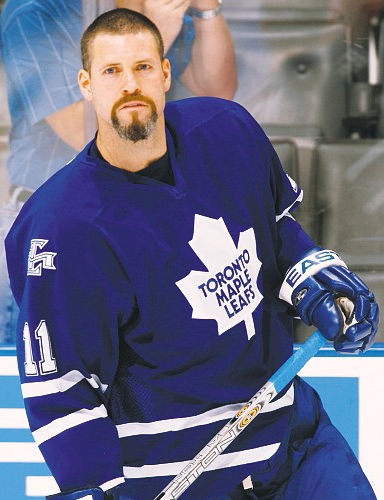 Although I’m still a young pup in this sports journalism game, most of my friends and family, as well as people following me on Twitter, have often ask me for my opinion on major events in sports.
Although I’m still a young pup in this sports journalism game, most of my friends and family, as well as people following me on Twitter, have often ask me for my opinion on major events in sports.
As you can imagine, I took lots of questions about the National Hockey League’s trade deadline. People wanted to know about what deals I thought would happen and how I felt about the moves teams made.
You know what? I didn’t think much of it at all. It’s a boring, media-generated event that is over-hyped.
This wasn’t always the case. I remember being an undergraduate at the University of Toronto and stopping people on the street to ask if they’d heard what the latest trade was and congregating with friends between classes to talk about the latest move.
Back then, big names were thrown around. I remember the palpable sense of excitement when the Toronto Maple Leafs landed Owen Nolan in 2003. I also remember the sense of regret and foreboding when the Leafs missed out on Rob Blake in 2001.
The difference between then and now is that the post-lockout collective bargaining agreement has instituted a salary cap (as well as a minimum) for all teams. Adding a big ticket player destroys any franchise’s budget. This cap makes crazy, last minute moves virtually impossible.
Yes, there have been some major moves made close to or on the deadline like Marian Hossa joining the Pittsburgh Penguins in Feb. 2008 or this year’s trade of Ilya Kovalchuk from the Atlanta Thrashers to the New Jersey Devils. But these deals were motivated by teams trying to dump expiring contracts before the free agents walked away for nothing. They are very temporary, and took months to negotiate.
Instead of the free-wheeling desperation deals of yore, trade deadline day consists of a gaggle of analysts trying to fill air time between commercials for hours on end.
I watched TSN’s coverage, which spent several segments introducing the many commentators they’d employed for the day. After nearly three hours of coverage they began to break some news, like the thrilling trades of Derek Morris for a fourth round pick in 2011 or Martin Skoula (being traded by a team he never played with) for a fifth round pick. Yawn.
If you really want to see exciting personnel moves in the NHL, wait for free agency to open up in the summer. That’s where teams are made in this day and age, not at the trade deadline. No, now the last day of the deal-making season is the home of third line centres and depth defencemen.
An ode to Booster Gold
It’s funny how everyone has a guilty pleasure - a band, movie or book that we love but was hardly a critical or commercial success. Comic book fans are no different. They always have at least a couple of characters that they hold dear to their heart.
I know that I’ve got a few. There’s one name that’s always at top of mind for me though: Booster Gold.
Never heard of him? That’s cool, most people haven’t. Indeed, it’s a running joke on an episode of Justice League Unlimited that everyone thinks that he’s Green Lantern and they’re disappointed when they find out that it’s Booster Gold.
Booster Gold is Michael Jon Carter, a collegiate football star from the far-flung future of the 25th century. He started placing bets on his own games and then threw them for profit. Disgraced, he became a night watchman at a museum that housed artefacts from the so-called Age of Heroes – our modern heroes like Superman and Batman.
With the help of a floating security robot named Skeets, Booster stole equipment and weapons from the displays, and used Rip Hunter’s time machine to travel to the 20th century. When he arrived in the 1980s he used his limited knowledge of historical events to position himself in the right place at the right time and become a superhero brand that would save lives as well as turn a healthy profit.
With Skeets acting as a roving encyclopedia, Booster blunders from heroic episode to heroic episode, often doing more harm than good while trying to create a public image that he can gain from financially. Recently (and somewhat improbably) he's become the guardian of the time stream, trying to maintain order and balance in the universe.
There are two things that appeal to me about Booster: his origin and how well he reflects the zeitgeist of the 1980s.
I think that the best fictional characters, superheroes and otherwise, have origins that explain their motivation for the rest of their existence. Sticking to comic books, some Batman, Spider-Man and the Punisher are popular because they are driven by a combination of guilt and anger over the death of their beloved family members.
All three of those creation stories make sense. To an extent, the reader can understand why these guys are dressing in spandex and putting their lives in danger. Their behaviour is clearly motivated by the tragedy in their origins.
Booster Gold’s driving force is simple: he’s greedy. He covers his uniform with corporate logos, puts money on the stock exchange before big bumps and is generally a glory hog. Or that time he married a sexagenarian for her money. It's not an altruistic reason for becoming a superhero, but it has an inherent logic. You can get what he’s about.
Just as Captain America was ideally suited to the surge of patriotism in the lead up to World War 2 or Marvel heroes like Iron Man and Nick Fury fit the Cold War era, Booster Gold’s 1986 debut was perfectly timed. He was just right for the greed is good, egotistical 80s. He developed as a character into the 1990s, just as corporate monopolies disguised as “synergy” and mass sponsorship became the norm in North America.
Booster Gold is often under-utilized but instantly appealing to anyone who grew up in the 1980s. He’s greedy, funny, a little bit cynical and surprisingly heroic. More than just about any other big name comic book character he fits into our contemporary worldview and, most importantly, he’s believable. The reader can understand why he does the things he does. He’s as real as a man from the future can be, and although he’s a guilty pleasure of mine, I rarely regret it.
Where does Sunday’s Olympic final place in Canadian hockey history?
Three days after Sidney Crosby scored in overtime to lift the Canadian national team to a 3-2 triumph over Team USA in the Olympic hockey final, the Canadian people are still deliriously happy. It’s the biggest international hockey win since the 2002 Salt Lake City games.
The most recent win is always the sweetest, but how does Sunday’s game rate in Canadian hockey history? I’m sorry to say that to me, it the fifth biggest... let’s break it down.
5. Sidney Crosby and Team Canada down Team USA 3-2 in overtime for Olympic gold
It capped a thrilling two weeks where Canada, at long last, won a gold medal on home soil, and then rolled to 13 more first place finishes for the Winter Olympics record. Canada also gained a measure of revenge against the United States who had embarrassed them earlier in the tournament, beating them 5-3.
Canada’s win was big for several reasons.
First and foremost, it was on home soil, with nearly 80% of Canada’s population watching in the arena or on television. What other event could captivate four out of every five people?
It also served as the perfect cap to two weeks of patriotic build up. Like a dam straining against a swollen river, Crosby’s goal unleashed the flood gates.
Crosby himself had virtually disappeared for the last three games, being held off the point sheet even in routs like Canada’s 7-2 man-thrashing of Russia. Having him rise to the occasion in extra time made it all the more surprising.
4. Team Canada’s 3-2 win over the United States to win the Olympic gold medal in women’s hockey
The only thing better than winning at home is winning on the road and disappointing your opponents’ fans.
Cassie Campbell, Hayley Wickenheiser, Cheri Piper, Kim St. Pierre and the rest of the women on Team Canada did just that as they dropped their one – and only – hockey rivals, Team USA.
There are two factors that make this victory particularly sweet. The first is that for once, Canada was the underdog in international hockey. That’s right, the Americans had won their previous eight meetings. That’s a heck of a big monkey for Team Canada to carry on their backs and it made this ninth meeting on the biggest of all stages especially intense.
The other is that the referee (an American) called a series of questionable penalties, all against the Canadians, including five straight in the second period and a total of 13. The United States were only assessed four minors, meaning that the Canadian squad had to play on its heels the entire time.
Holding off a late surge, the Canadian women held off their arch-rivals for the biggest win in women’s hockey history.
3. Montreal Canadiens and Red Army battle to 3-3 tie on Dec. 31st 1975
Super-Series ’76 grew out of the popularity and success of the 1972 and 1974 Summit Series. Instead of playing all-star teams from the National Hockey League and the World Hockey Association, the Super-Series pitted the Soviet Wings and the Red Army (two of the top teams in the Soviet Union’s hockey league) against eight NHL teams.
The Canadiens were one of the best teams in the NHL at the time and went on to win the Stanley Cup that season. Many considered it to be a World Championship of professional hockey. It ended up being was a showcase for the considerable talents of Soviet goaltender Vladislav Tretiak who faced 35 shots while his team only mustered 13 against future Liberal MP Ken Dryden.
Unlike the other games on this list, Canada didn’t win. However, as argued over on HockeyAdventure.com, it was the most entertaining game ever.
As a whole, the Super-Series underscored the fact that Soviet-style hockey could work against North American teams, moving the NHL towards the fire-wagon brand of hockey popular in the 1980s.
2. Canadian men top Team USA 5-2 in Olympic gold medal game
The most memorable and important hockey game in my lifetime, this game is significant for several reasons.
First of all, it allowed Team Canada and the nation as a whole a level of catharsis after being upset by the Czech Republic in the 1998 Olympics in Nagano as well as avenging themselves on Team USA after a devastating loss to the Americans at the inaugural World Cup of Hockey.
Both losses had wounded the national psyche and called into questions the direction of Hockey Canada.
Further, Canada hadn’t won a gold medal in the Olympics for fifty years, not since the 1952 games in Oslo, Norway. It was an opportunity to regain dominance in a sport that many Canadians consider their rightful property.
It also featured the best hockey play I’ve ever seen.
With the United States leading 1-0, Chris Pronger carried the puck past the blue-line where he suddenly stopped, shaking off the American covering him. He wired a pass to captain Mario Lemieux who raised his stick for a one-timer. As a smile flashed across his face, the cornerstone of the Pittsburgh Penguins let the puck slip between his legs to a streaking Paul Kariya who snapped a shot past a startled Mike Richter.
Pronger’s pass was good. Kariya’s speed and skill were great. But nothing – nothing – will ever top the incredible hockey sense and awareness that Lemieux displayed on that play. I could watch that play all day, every day. It’s poetry in motion.
1. Canada wins on Paul Henderson’s goal in the final minute of the eighth game of the 1972 Summit Series
You knew this had to be number one. The gran’ daddy of them all, the 1972 Summit Series irrevocably changed the international game of hockey, undoubtedly for the better.
The context of the series itself was incredible. Canada had withdrawn from almost all international competition, even going so far as to cancel the 1970 World Junior Championship in Winnipeg.
As a result, only a handful of North Americans had ever seen the Soviets play hockey. The game developed in a vacuum behind the Iron Curtain, creating a more finessed style of play that relied heavily on teamwork and passing plays as well as conditioning and stamina.
Canada’s brand of hockey was a more physical, individual game including using their bodies to block shots. Team Canada’s stickwork was fancier, using tape-to-tape passes that didn’t touch the ice and flipping the puck in over the defence.
The styles clash was epic, and changed how the game is played as both sides of the Cold War began using each other’s tactics and strategies.
Further, sports were becoming increasingly political. Just that summer the Israeli team had been massacred at the Munich Olympics and most African nations had boycotted the summer games entirely to protest Rhodesia’s apartheid state.
Also, unlike the other matches on this list, the Summit Series was played over the course of four weeks with tension mounting after each game. By the time the eighth and final game was played in Moscow, it seemed like the Cold War was hanging in the balance.
That last game is a classic. Whether it’s Peter Mahovilich jumping over the boards to rescue Alan Eagleson from Red Army officers or J.P. Parise threatening to slash one of the referees, the tension is palpable. With Henderson’s wonderful, desperate goal all of that pent up emotion was unleashed in a moment that still sends chills down Canadian spines.
Nothing will ever be able to top that moment for Canadians.
Richard Martel of the Chicoutimi Sagueneens now QMJHL’s winningest head coach
In addition to writing junior hockey round-ups and watching the Olympics, I spent much of my weekend putting together a feature story for the Canadian Press on Richard Martel's record-setting 570th Quebec Major Junior Hockey League win.
No one is more surprised to be the Quebec Major Hockey League’s winningest head coach than Richard Martel.
Martel achieved the milestone Sunday night when his Chicoutimi Sagueneens beat the Baie-Comeau Drakkar 3-1 for his 570th career victory. With that, he surpassed QMJHL Hall of Famer Guy Chouinard for the all-time record.
“When I started in the QMJHL I just wanted to be involved in the hockey community,” said Martel. “I thought I’d have a job for a long time, but not for 20 years.
“I’m very proud to be a coach in the QMJHL . . . I feel privileged — very privileged.”
Since it was written for syndication, it's been picked up by several newspapers and websites including the Globe and Mail, the Winnipeg Free Press, the Guelph Mercury, the Halifax Metro and SportsEast.ca.
I was really pleased with this article and I hope you enjoy it too.
My weekend in junior hockey, Feb. 26-28
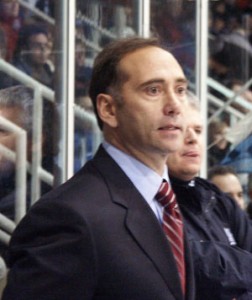
Richard Martel, head coach of the Chicoutimi Sagueneens won his 570th game on Sunday, a QMJHL record.
This weekend, when I wasn’t obsessing over the Olympics, I was all about the Quebec Major Junior Hockey League.
It was an incredible couple of days with Moncton’s Nicola Riopel setting a goaltending record Saturday night, only to be topped less than 24 hours later by Drummondville’s Jake Allen. On top of that, Sunday saw Richard Martel become the winningest coach in league history when his Chicoutimi Sagueneens dropped the Baie-Comeau Drakkar 3-1.
But first, let’s talk about goaltending.
As a gross generalization, each league within the Canadian Hockey League produces particularly strong types of players. The Western Hockey League’s rough and tumble style lends itself to defensively minded players who are always ready to drop their gloves. The Ontario Hockey League produces tight, disciplined players who focus on positioning and off-puck work. The QMJHL? It’s all about the goalies.
The league is a factory for superstar goaltenders – Felix Potvin played for the Chicoutimi Sagueneens and Roberto Luongo played for the Val-d’Or Foreurs and the Acadie-Bathurst Titan.
As good as those two are, they’re not even the best to come out of the QMJHL. Patrick Roy and Martin Brodeur, the two best goaltenders ever came from the league, setting the standard for all netminders worldwide.
So when Nicola Riopel of the Wildcats passes all those names on his way to the second-longest shutout streak in league history it’s kind of a big deal. Riopel’s record ended at 179 minutes 59 seconds Saturday night.
However, it was an even bigger deal when Jake Allen of the Voltigeurs passed Riopel the very next day. Allen lasted nearly ten minutes longer, going 188 minutes 47 seconds without giving up a goal.
Really, it’s incredible stuff, and shows that these two players will be around for a long time.
Of course, it was all over-shadowed by Martel’s accomplishment of winning 570 games as a coach. Martel’s never won the President’s Cup as a head coach, but he did win it as an assistant way back in 1990 with the Sagueneens who were backstopped by a young Potvin.
I had the pleasure of speaking with Martel this past weekend for a feature story, and I was impressed with his humility and dedication to the young men he teaches. I also spoke to league commissioner Gilles Croteau who went on at length about what an asset Martel is to the league and Canadian hockey in general.
What a great weekend for hockey in Quebec.
Friday, Feb. 26 2010
QMJHL – P.E.I. drops Chicoutimi 4-3 in shootout
The Chicoutimi Sagueneens earned a point for their coach Richard Martel, but not a coveted milestone.
Cody Linteau had the only goal in the shootout as the P.E.I. Rocket disappointed the Sagueneens 4-3 in Quebec Major Junior Hockey League action Friday night. (See more...)
OHL – Tanski, Hodgson help Battalion defeat Majors
Cody Hodgson's return to the Brampton Battalion could not have been more timely.
Scott Tanski and Hodgson combined for three goals and six points to spark the Battalion to a 4-0 victory over the Mississauga St. Michael's Majors on Friday night in the Ontario Hockey League. (See more...)
WHL – Bloodoff brothers both score as Kelowna beats Oil Kings
Three streaks came to an end in Edmonton Friday night.
Brothers Lucas and Evan Bloodoff scored as the Kelowna Rockets snapped a five-game losing streak with a 4-0 victory over the Oil Kings in Western Hockey League action. (See more...)
Saturday, Feb. 27 2010
QMJHL – Wildcats edge Halifax as Riopel makes QMJHL history
Nicola Riopel has made his mark in Quebec Major Junior Hockey League history.
Riopel made 21 saves as the Moncton Wildcats edged the Halifax Mooseheads 4-3 on Saturday. (See more...)
OHL – Erie stays in playoff hunt with win over Ottawa
The struggle for playoff spots continues in the Ontario Hockey League.
Anthony Luciani and Greg McKegg scored twice as the Erie Otters dropped the Ottawa 67's 7-1 Saturday night. (See more...)
WHL – Stanton scores twice as Warriors edge Bruins
The Moose Jaw Warriors have made the most of their time at home.
Defenceman Ryan Stanton scored twice as Moose Jaw hung on to beat the Chilliwack Bruins 3-2 in Western Hockey League action Saturday. (See more...)
Sunday, Feb. 28 2010
QMJHL – Martel wins 570th as Chicoutimi sinks Baie-Comeau
Sunday was a record-setting day in the Quebec Major Junior Hockey League.
Chicoutimi Sagueneens' head coach Richard Martel earned his 570th career victory, the most in QMJHL history, as Chicoutimi sank the Baie-Comeau Drakkar 3-1. (See more...)
OHL – Lopes scores two as Majors prevail over Oshawa
The Mississauga St. Michael's Majors are firing on all cylinders as the playoff window is closing on the Oshawa Generals.
Ryan Lopes scored a pair of goals and defencemen David Corrente and Blake Parlett had four-point games to power Mississauga to a 7-4 triumph over Oshawa in Ontario Hockey League action Sunday afternoon. (See more...)
Canada/USA has made me into a fan of women’s hockey
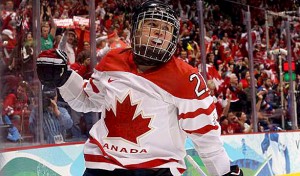 I am embarrassed to admit that last night was the first time I have ever watched a women’s hockey game from start to finish. A terrible sin, I know.
I am embarrassed to admit that last night was the first time I have ever watched a women’s hockey game from start to finish. A terrible sin, I know.
I had seen periods from games or seen bits and pieces, but for a host of reasons I’ve never been able to sit and watch a women’s game to completion. But I’m glad I finally did.
It was the perfect game to watch as Canada held on to an early 2-0 lead to down their arch-rivals from the United States and win their third consecutive Olympic gold medal.
There was a lot to like about the match-up. As the prohibitive favourites in any international tournament, the North American teams had often locked up at the highest levels of competition, whether at the Olympics or World Championships. As a result, the two teams are very familiar with each other’s tactics and strategies.
It quickly became apparent that women’s hockey has a style all its own thanks largely to the prohibition of body checking.
Personally, I’ve always thought this was a sexist rule that implied that women were too fragile to withstand physical play. It just made no sense – why could a woman not safely hit another woman? They would be physical equals, with no particular danger of injury.
However, the lack of big hits means that the scourge of entertaining hockey – the Trap – is impossible. The resulting game is fast and free-flowing with few stops in play. It’s refreshing compared to the National Hockey League where clogging the neutral zone has often been the fastest way to the playoffs.
The players on both teams were exceptional passers and play makers. Throughout the game there were creative tape-to-tape passes generating scoring chances. The Canadians in particular had a knack for finding each other on the ice.
When they had those openings, the Canadians were patient, waiting for defenders to over-commit themselves to a blocked shot. Canada often exploited their opponents’ mistake with a sharp pass for another quality chance. It was inspiring hockey.
Team Canada was also impressively dedicated to defence, dropping to their knees to block shots and passes, fending off a 5-on-3 power play for nearly a minute and a half at the start of the second period.
It was a lot of fun to watch, with both teams evenly matched.
That said, I don’t regret missing any of their other games. They were all lopsided blowouts that made me feel bad for the have-nots in women’s hockey. This is the sport’s greatest weakness – only a Canada-USA match-up showcases the very best of the game. Every other pairing is horribly one-sided.
When the next world championship rolls around, I’ll make sure to watch – as long as the game has Canada and the USA in it.
A side note: The fact that Team Canada had to apologize for their celebratory drinks and cigars on the ice is utter nonsense. The arena had emptied out and they were revelling in their success in what should have been a private moment. They should be allowed to let their hair down, guilt free.
I won’t go on any further, as too much ink has already been spilled over this story.
In Defence of Own the Podium
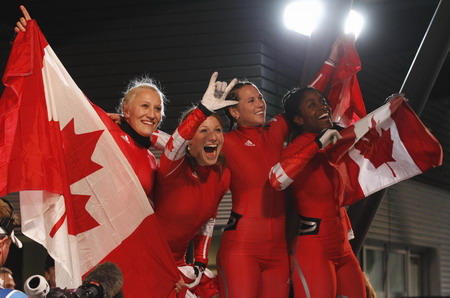 Wednesday was Canada’s best day for Olympic medals, with the teams of Kaillie Humphries/Heather Moyes and Helen Upperton/Shelley-Ann Brown winning gold and silver in a 1-2 punch in women’s two-person bobsleigh. The women's 5,000 metre speed skating relay team earned a silver medal. Adding to the medal haul was Clara Hughes, who earned her sixth career Olympic medal, a bronze in 5000m long track speed skating.
Wednesday was Canada’s best day for Olympic medals, with the teams of Kaillie Humphries/Heather Moyes and Helen Upperton/Shelley-Ann Brown winning gold and silver in a 1-2 punch in women’s two-person bobsleigh. The women's 5,000 metre speed skating relay team earned a silver medal. Adding to the medal haul was Clara Hughes, who earned her sixth career Olympic medal, a bronze in 5000m long track speed skating.
Although Team Canada’s 7-3 thrashing of the Russian Federation grabbed all the headlines, it was a banner day for Canada’s less glamorous Olympic sports that may have helped justify the Canadian Olympic Committee’s controversial Own the Podium program, just as it appears to be on its last legs.
Designed to give Canada the highest medal count at the 2010 Vancouver games, the Own the Podium program increased spending on winter Olympic sports by $21-million annually over the course of five years, with money coming from provincial and federal governments as well as private sponsors like Bell Canada. The goal was for Canada to earn a total of 35 podium finishes.
This plan has drawn criticism from all corners. Other countries (particularly the British media) have described it as an “un-Canadian” initiative. Apparently, it’s against the national character to be competitive in anything other than men’s hockey. A proposterous claim given that the Olympics, by definition, is about pushing the envelope and achieving new heights.
At the same time, some domestic media were unhappy that so much public funding - $118 million in total – was being spent on athletics when it could be applied to pressing issues like education, health care or the flagging economy.
As of this writing, Canada has stepped on to the podium 15 times, and might finish in the top three in men and women’s hockey, men and women’s curling and speed skating. Realistically, Canada will finish with around 20 medals, just shy of their 2006 Turin total of 24, and well short of Own the Podium’s stated goal of 35. On Monday, the COC announced that it was no longer aiming to top the medal tables at Vancouver.
In other words, CEO Roger Jackson and his staff have disappointed just about everybody, except the athletes.
Although the program has not met expectations, I think that in the long run it will make Canada into a more formidable sporting nation. At long last, Canadian athletes are getting the support they so richly deserve, allowing them to finally put their best foot forward in international competition.
Their performance at the Vancouver games will serve as an inspiration to Canada’s youth, spawning a new generation of world-class athletes. Yes, the money could have been spent on other projects, but giving Canadian children role models to look up to is certainly a worthy pursuit.
Further, this initiative is just catching Canada up to the rest of the world. In many cases, the athletes from other nations in the winter Olympics are members of the military.
For example, Tuffy LaTour, the coach of Canadian men’s bobsleigh team, is a retired army sergeant from the United States who competed with the American military’s sledding team.
Dan Humphries, the husband of Canadian gold medalist Kaillie Humphries, and a member of Canada’s four-man bobsleigh team, was originally a member of the British Army’s slidding team.
Heck, Finland won the Winter War against the Soviet Union by their superior biathlon skills.
Canada, with its significantly smaller population and military complex, needs a boost to its athletics programs, and Own the Podium is it.
Just as the Calgary Olympics created a home base for Canadian sports, the combination of the Vancouver games and Own the Podium will start a new golden age in the Canadian Olympic movement. It appears as though most of Own the Podium's sponsors, both public and private, will stop funding after the closing ceremonies this weekend, which would be a shame.
Da! Da! Canada! Nyet! Nyet! Soviet!
We all knew it was coming – at some point, Russia and Canada had to play each other in this Olympic hockey tournament. The rock and the immovable object, the two hockey superpowers were destined to face each other, even if it’s not in the ideal gold medal game.
After struggling against Switzerland and losing to Team USA, Canada’s coaches and management seem to be back on track and have made some strong decisions. Even after a decisive 8-2 win over Germany, Wednesday night’s game against Russia is still going to be the closest, most fraught match-up of Canada’s entire Olympic tournament.
Head coach Mike Babcock and his assistants are definitely doing some things right. For example, they’re smart to keep Chris Pronger off the ice and therefore out of the penalty box.Yes, Pronger’s a big bruising defenceman who is a great leader in the locker room, but under the stricter rules of international hockey he takes too many penalties. So far he hasn’t spent a single moment in the sin bin, and Team Canada is all the better for it.
Keeping Pronger benched isn’t just addition by subtraction; it’s giving more ice time to younger, more disciplined defencemen.
The blue-liners that have benefited most from this are Drew Doughty and Dan Boyle. Both have made smart choices on offence, jumping into the rush at opportune time and creating plays with smart passes. Their defence hasn’t suffered either – their teammates can depend on them to separate the man from the puck.
Similarly, Babcock made the right call replacing Martin Brodeur with Roberto Luongo, even if it came too late for most fans liking.
Although he holds just about every National Hockey League goaltending record, ever, Brodeur has looked shaky in net. Most people will focus on his poor performance against the United States, but he looked uncomfortable against Switzerland as well. Brodeur had a hard time tracking the puck, gave up big rebounds and lacked confidence against the Swiss.
With Luongo between the pipes and Pronger on the bench, there’s a good chance that Canada’s superior defence will be able to shut down the formidable Russian offence lead by Alexander Ovechkin, although there are still some nagging questions.
Most significantly, Sidney Crosby doesn’t seem comfortable in his own skin, even if he did click with Jarome Iginla and Eric Staal Tuesday night.
This is compounded by the fact that the coaching staff seems intent on making Crosby the focal point of their attack, having him take a penalty shot that Rick Nash earned against the Germans. I understand that they want to get him scoring again, but Nash is more than capable of taking a penalty shot. They don’t want to cut off their nose to spite their face.
Honestly, it’s anyone’s game. Sure, Team Canada was embarrassed by the Americans, but the Russians were also upset by the Slovakians. Canada’s defence is stronger than Russia’s, but the Russian attack is more powerful than Team Canada’s. It’s a trade off.
For Canada to win they need to come out strong and fire on all cylinders - not just the players but the coaches too. They simply can't make any missteps.
Three ice dancing performances I’d like to see
Like many Canadians, I was thrilled by Tessa Virtue and Scott Moir’s gold medal ice dance performance on Monday night.
I would never call myself a figure skating or ice dancing fan – I find that too often the judge’s decisions are political – but I was impressed with the athleticism and technique of all the dancers in the competition.
What did not impress me was their lack of creativity or originality. Most of the performances bled together. Virtue and Moir stood above the rest of the competition because they didn’t rely on clichéd music like the themes from the Phantom of the Opera or Requiem for a Dream. They weren’t covered with sequins and feathers. Their performance truly distinguished them from the rest of the pack.
As I was watching all the performances roll off the assembly line, I couldn’t help but come up with ideas of my own. Not necessarily for me to perform since I’m a terrible skater, but ideas that talented ice dancers could use to blow away the judges and competition. Here are my top three:
Super Mario Brothers -Mario and Princess Peach.
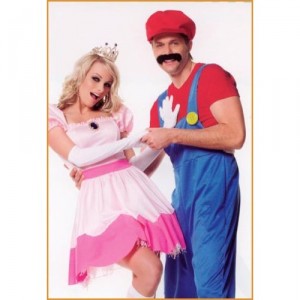 The pinnacle of video game romance, Super Mario’s quest to save his true love, Princess Peach, is timeless and crosses all cultures. Their tale of love denied has ties to Japan, Italy and North America and would undoubtedly hold appeal to judges from many nations.
The pinnacle of video game romance, Super Mario’s quest to save his true love, Princess Peach, is timeless and crosses all cultures. Their tale of love denied has ties to Japan, Italy and North America and would undoubtedly hold appeal to judges from many nations.
The music is all there too. Obviously, the symphonic version of the Mario theme is a good starting place, but if the performers want to make things a little more contemporary theys can break it down and use a medley that incorporates DJ Clue’s remix of the classic 8-bit song.
The costumes are easy too – the male dancer would wear red overalls, a red newsie cap, white gloves and a giant fake moustache. Princess Peach’s costume is even easier, since most figure skaters already wear giant pink dresses and crowns. The one adjustment is that for safety reasons the ice dancer’s costume would need a shorter skirt then the Princess’ traditional ball gown.
After all that preparation the performance will write itself. Trust me.
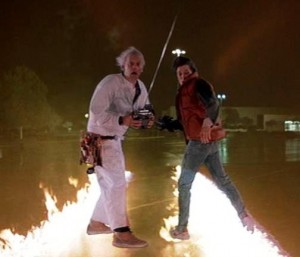 Back to the Future – Marty McFly and Doc Brown.
Back to the Future – Marty McFly and Doc Brown.
Not a love story necessarily, but Marty McFly and Doc Brown have one of the best bromances in movie history.
The strength of the Back to the Future pairing is that the music would blow the competition away. Nothing could top Huey Lewis’ "Power of Love" for the short program (complete with air guitar) followed by Alan Silvestri’s Back to the Future theme for the long performance.
The biggest problem with this program, of course, is that both characters are male. However, a petite brunette with short cropped hair could easily play Marty McFly. Tight jeans, a denim shirt and McFly’s trademark red vest would complete the ensemble. A big white wig and flowing lab coat would transform the male dancer into Doc Brown, and your theme is complete.
Liberal use of a fog machine, and perhaps a Delorian door for the ice pad’s entrance would complete the performance and a much needed sense of adventure to the proceedings. I have it on good authority that you don’t need money, you don’t need fame, you don’t need no credit card to ride the Olympics train.
Star Wars – C3PO and R2D2
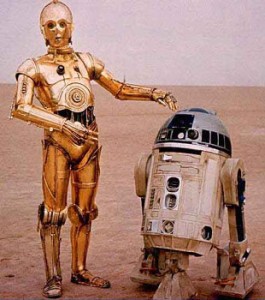 Yes, there are more traditional romantic pairings like Han Solo and Leia Organa, while Luke Skywalker and Princess Leia could appeal to those icky brother-sister ice pairs like Russians Roman and Alexandra Zaretsky or Brits Sinead and John Kerr. However, for my money, the best couple in the Star Wars movies are C3PO and R2D2. They stick together no matter what and have exceptional teamwork. Aren’t those ideal traits for an Olympic-calibre performance?
Yes, there are more traditional romantic pairings like Han Solo and Leia Organa, while Luke Skywalker and Princess Leia could appeal to those icky brother-sister ice pairs like Russians Roman and Alexandra Zaretsky or Brits Sinead and John Kerr. However, for my money, the best couple in the Star Wars movies are C3PO and R2D2. They stick together no matter what and have exceptional teamwork. Aren’t those ideal traits for an Olympic-calibre performance?
Also, the music is a slam dunk. John Williams’ score from the Star Wars movies is one of the most recognizable pieces of classical work and is suitably epic for an ice dancing performance.
I would make my performance an interpretation of the Droid’s journey, beginning with their escape from the Blockade Runner in A New Hope. A bold coach might even incorporate Leia’s desperate holographic message to the Rebel Alliance. As the dancers flee from corner to corner of the ice, extras in Stormtrooper outfits could emerge from the audience to wildly fire blasters at them. It’d be exciting and allow the dancers to display all their most graceful tricks.
The one drawback of this piece would be the construction of R2D2’s outfit. However, I’m sure a talented costume designer could tackle the project and the result would be more dignified then dressing as a tree or performing to Linkin Park’s "Crawling".
